In healthy women, the menstrual cycle is a fairly stable amount, but subject to the influence of circumstances. It's about internal problems of the body, and about outside interference. Quite often, the monthly ones after the treatment procedures change in any way. This is facilitated by the very intrusion into the body and the associated stress. Sometimes changes are the norm, in other cases they are an alarming sign.
Menstruation and antibiotics
The society and specialists relate to the use of antibiotics in different ways, but it is obvious that their positive impact far exceeds the disadvantages. Nevertheless, the latter exist. One such is the failure of the menstrual cycle. More often it happens after taking strong drugs. And they are prescribed for the most dangerous infections, after operations, which in themselves are able to break the cycle. It manifests itself in different ways:
- An earlier arrival of monthly;
- Intensity of discharge is greater or less than usual;
- Increase in the interval between menstruations;
- Long, monthly, usually not typical of a woman.

The best prophylaxis for this problem will be an accurate regimen of antibiotic intake, choosing them by a specialist, not by a patient. Self-treatment with drugs that have a strong effect on the body is dangerous, including reproductive problems.
Monthly and gynecological operations
Surgical intervention is a shock to the body, even when done to save lives. Operations on women's bodies are inherent in a large extent. Nevertheless, with quality treatment without complications, many women in this sense do not have problems. In others, in the same circumstances, cycle failures and other irregularities occur.
Does laparoscopy affect menstruation
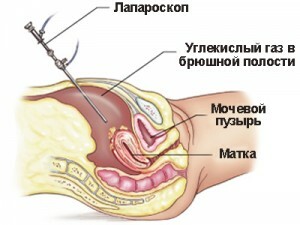
Laparoscopic operations are considered easier for patients. This method is used for diagnostic purposes. One of the causes of laparoscopy is female infertility. This operation helps with the presence of adhesions, as well as the obstruction of the fallopian tubes.
As a rule, menstrual periods after laparoscopy come on a menstrual calendar. The operation is usually prescribed for the period preceding ovulation, that is, a week or 10 days after the previous critical days. In the absence of complications, the following should be waited in due time. If the wait was delayed and not accompanied by other strange signs, there is no danger. Finally, the cycle will be restored in 3 months. After laparoscopy, there may be 3-week spotting associated with the intervention, but you should not confuse them with menstruation.
Many are interested in the question of what will be the monthly ovarian cysts after laparoscopy. After all, these organs are directly involved in the whole cycle. It is worth knowing that the cyst in most cases appears when the follicle overrides, when the yellow body does not fall into the fallopian tube. The cell is filled with liquid and if it does not manage to dissolve until the next maturation of the egg, it grows and causes inconvenience. Other causes of cyst formation are the dilatation of the yellow body, the rupture of blood vessels in it or the development of ovaries.
But in all cases, its removal does not require intrusion into the organs themselves. Therefore, menstruation should come on time, and if the timing shifts, then slightly.

Menstruation and mini-abortion
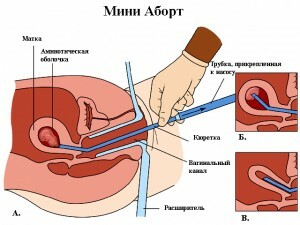
The most unnatural operation on female organs is abortion. The one in question is a more gentle option and is a stretching of the fetus from the uterus using a special pump.
However, women notice that the months after the vacuum are delayed. Experts consider this to be normal if the cycle lasts up to 40-43 days. Sometimes it does not even break, and menstruation comes like clockwork. But it depends on the general condition of the woman, her individual characteristics.
If the procedure is poor in the uterus, parts of the fetus or placenta may remain. Woman Test:
- Weakness;
- Abdominal pain;
- Vertigo;
- Nausea and vomiting.
The delay in this case can be less than 10 days, but the doctor will understand that vacuum aspiration is not done completely, and will take measures. Therefore, it is very important to observe for at least 2 months, after an operation of ultrasound. A simple test here is not informative, because, despite a full abortion, the woman remains hormones that indicate pregnancy.
If everything went well, the day of the operation is considered the beginning of a new cycle. To find out the time of the next menstruation, you need to add its usual duration.
A woman needs to monitor the intensity of menstruation. If they are too abundant, it may be worthwhile to check for endometriosis. Another consequence may be increased pain. In general, the speed of recovery of a cycle depends on:
- Age of the patient;
- Available diseases, including, gynecological;
- Hormonal disorders;
- Birth before the mini-abortion, whether they were normal or pathological.
Treatment of erosion and monthly
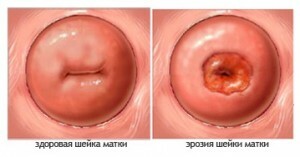
Changing the epithelial layer of the cervix requires compulsory treatment. Once physicians preferred to wait, but now it is obvious that procrastination can be very costly for a woman, since erosion degenerates into a malignant tumor. The treatment is determined by a specialist. Quite often they get rid of erosion by cauterizing the altered areas. This method is almost 100%, but characterized by a long healing. Therefore, before deciding on a procedure, many women are interested in what will be the monthly after cauterization.
After a while after it, watery discharge is observed. This is how the tissue is regenerated, because of the procedure a scab is formed. Menstruation usually comes on schedule, all of its features, which existed before cauterization, are preserved. Allocations for the first time can be more intense if at subsequent examinations the doctor was careless and damaged the scab.
Delays after cauterization of erosion are also permissible, are not a dangerous symptom if they do not exceed 7-10 days and do not last longer than 3 cycles. Among their causes are identified:
- Reaction of tissues to injury, regardless of the method of manipulation;
- Response of the uterine receptors to intervention;
- Psychological stress.
It happens that after cauterization of erosion there is no monthly for a longer time. Then the reasons should be revealed by a specialist. Perhaps the woman did not cope after the manipulation, for example, took a hot bath, lifted weights or had sex, which until complete healing of the scab is impossible.
Hysteroscopy and menstruation
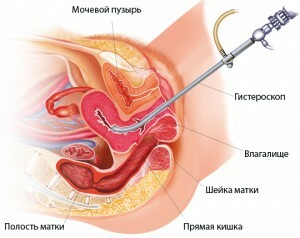
Modern medicine allows full examination of female organs, including using a hysteroscope. It is an apparatus capable of showing a specialist what can not be seen using tools. Hysteroscopy is necessary for revealing an ailment and treatment, allows the doctor to know all the nuances of the uterine cavity: the size, color of the integument, pathology. If the manipulation is done for diagnostic purposes, it does not have a noticeable effect on the body, so it is not worth waiting for problems with the cycle. Another thing is when hysteroscopy is used as a method of treating polyps, fibroids, endometrial hyperplasia. For the patient, this is a more serious intervention. And the doctor in both cases should have a certain qualification and experience, so that the procedure will do without negative consequences.
Normally, monthly after hysteroscopy should start on time, that is, according to the menstrual calendar. Delay of up to 14 days is also permissible and indicates only the stress transferred by the body. If hysteroscopy was done to get rid of polyps, fibroids, adhesions, scraping, the first day of the new cycle is the one in which the operation was performed. The next menstruation will come in 21-35 days, as it was before her.
Much worse when a woman watches in her abundant discharge. They can mean that manipulation has triggered uterine bleeding, organ perforation or endometritis. Important indicators are the color and odor of discharge. A sharp unpleasant with blackness may be a sign of endometriosis or the onset of an inflammatory process. Menstruation, lasting longer than usual, looks like a symptom of damage to the mucous uterus or fallopian tubes.
Monthly and contraceptives
The means of preventing pregnancy certainly affect the monthly. After all, the mechanism of their action on this is based, although in some women the process is different from the norm and causes legitimate concern.
Influence of the contraceptive tablets
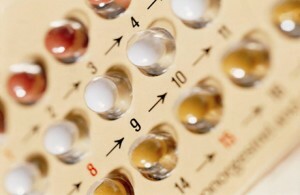
Evaluation of their use is ambiguous. Some consider oral contraceptives not only a reliable way to prevent pregnancy, but also a medicine against many female diseases. Others perceive them as a delayed sentence for the body as a whole.
The operation of birth control pills is to prevent ovulation. This is possible due to a decrease in the concentration of some hormones and an increase in others. The uterus during the period of their exposure is covered with a thick layer of mucus, depriving the egg of its ability to gain a foothold on its wall, and spermatozoa penetrate inside. The normal cycle is broken, so there is no menstruation.
The use of hormonal contraceptive pills for at least a couple of months can affect the female body in such a way that the cycle does not recover immediately. It happens that there are no monthly after ok for almost six months, and when they start, the cycle becomes shorter or longer, other changes are noticed. There are other possible reasons for the prolonged delay associated with the abolition of hormonal tablets, especially after their long use:
- Pregnancy. This can not be ruled out, since there is no one hundred percent means of contraception. A woman first thing to do a test or pass an analysis in a women's consultation;
- Venereal infection. Tablets will not protect against pathogens, although this is the least likely cause;
- Dysfunctions in the functioning of ovaries or other hormone-producing organs, polycystosis, cyst in the uterus;
- Oncological disease;
- Amenorrhea. Similar often occurs in very young or, conversely, mature women. Reception ok provokes already existing, but still unsolved pathology of reproductive or endocrine organs to react in this way. Termination of menstruation should be treated with drugs that stimulate the work of the ovaries. But the expert should choose them, taking analyzes.
Any delay after the abolition of birth control pills, lasting longer than 3 months, needs to be treated by a gynecologist and identifying the exact cause. Another reason for panic can occur in the case of a sharp withdrawal of drugs in the middle of the course. The occurrence of severe bleeding. To avoid this, you need to stop receiving after a month from the beginning and the next course is simply not to start.
IUD and monthly
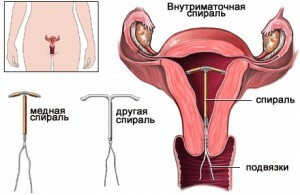
The intrauterine device will also save from unplanned conception, but will affect the nature and duration of menstruation. It is worth saying that the remedy is put in its last days, while the cervix is ajar for a painless and accurate injection. It is noted that the first and second months with the spiral are more abundant and prolonged. Then they are made less intense than usual, they can come irregularly. It is not surprising, because in the womb is a foreign body, to which the body should get used. Over time, they return to the old norm and correct cyclicity. If this does not happen, and the woman feels that with each menses, it simply bleeds, losing strength, the spiral must be removed. Such an organism response to the
IUD can mean:
- Inflammatory disease;
- Displacement of the contraceptive in the abdominal cavity;
- Infections;
- Perforation of the uterus.
Any of these states does not allow the use of a spiral, but requires immediate assistance.
Even if the IUD was the ideal method of contraception, sooner or later it will have to be removed for replacement, or as useless if the woman decided to become pregnant. And before one or the other happens, the gynecologist will recommend several cycles to rest. Immediately after extraction, small bleeding may occur, accompanied by mild pain. Do not take them for menstruation, it's just the body's response to the absence of the already familiar contraceptive.
Monthly after the spiral come in accordance with the calendar or with a small delay. If she was hormonal, postponement of critical days is even more likely. As well as violations of the cycle for several months, a decrease in the volume of discharge, shorter menstruation. A long absence of menstruation can say:
- About pregnancy;
- About ovarian dysfunction;
- About inflammatory diseases.
It is not uncommon to have heavy menstruation after the extraction of the spiral. They are caused by already listed pathological causes or hormonal imbalance.
Menstruation and diseases
The menstrual cycle is closely related to all the processes taking place in the body. It is not surprising that women suffering from serious diseases have problems with menstruation. The influence is also exerted by drugs that are used in the therapy of ailments.
The impact of chemotherapy on the
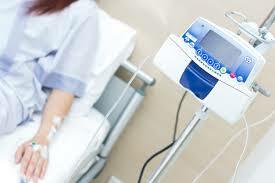
cycle The chemotherapy used to treat malignant tumors is a systematic intake of toxic drugs. Their influence on the ovaries is inevitable and is expressed in the suppression of the function of the organs. Therefore, menstruation after chemotherapy can completely stop, since the female germ cell does not mature. If the patient is still young, which in our time is not uncommon, experts try to restore menstruation and return the opportunity to become a mother. This is done with the use of hormonal drugs and properly selected treatment tactics.
Sometimes a temporary discontinuation of menstruation is an early menopause. Her offensive is possible even at 35, when most women without such a diagnosis and do not think of anything similar.
Symptoms of early menopause are:
- Absence of menstruation for longer than a year;
- The level of hormones corresponding to the period of menopause.
There are also cases when a delay in menstruation after chemotherapy meant pregnancy. So it makes sense to do the test before panicking about the lack of menstruation.
Cystitis and monthly
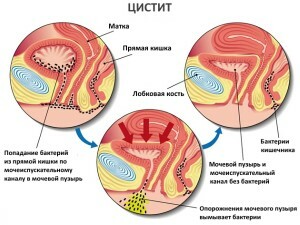
A common disease of the bladder and in itself delivers many unpleasant minutes. And in combination with menstruation, sensations intensify. It is established that most cases of cystitis begin precisely in critical days. Experts also noted that infection from the urinary system inevitably falls into the genital. With the removal of the outer layer of the endometrium and the widening of the opening of the cervix, disease-causing bacteria easily enter it. Cystitis during menstruation causes severe pain, which is indicative not only of a bladder injury, but also a malfunction of the ovaries. This symptom is called algodismenorea. Similar happens and in addition to cystitis, but with this diagnosis is also characterized by
- Frequent urge to urinate, accompanied by severe pain;
- Depression and irritability;
- Pain in the abdomen and in the margin.
Infectious inflammation of the bladder can cause a delay in menstruation. And if this is so, then at the examination it usually turns out that the woman has a chronic gynecological or venereal disease.
Endometriosis and monthly
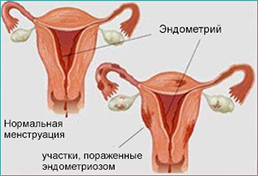
Menstruation is the process that can make you aware of the presence of this disease is not very attentive to your woman. Monthly for endometriosis is characterized by abundance and darker color than usual, as well as intense pain sensations. The latter is easily explained by the fact that the volume of the organ in the disease increased and spread beyond the uterus, possibly into the abdominal cavity, the ovaries.
Endometrium after menstruation is restored everywhere, where he managed to grow during the illness. After a new cycle, it loosens again, begins to bleed and withdraw its upper layer, not only through the genital tract outward, but also into the abdominal cavity, causing unbearable pain. The consequences of this can be the saddest if you do not take timely measures. In the more severe stage of endometriosis, with monthly women, blood-resurfacing drugs or even drugs that can stop menses can be hospitalized and injected.
Does the stroke affect the menstruation of
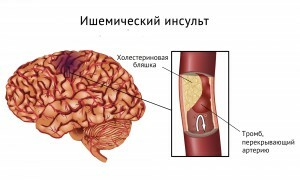
? Vascular diseases in the last few decades have "grown younger."Therefore, a stroke in women of reproductive age occurs more often. The causes of this disease lie in the field of neurology and, it would seem, to the genital area are irrelevant. But the factor provoking a violation of cerebral circulation, including thick blood. On menstruation, it affects so that the discharge can become more viscous, dark and rather scarce.
Even more important is the stress experienced by a woman who has experienced cerebral circulation and its consequences in the form of a possible difficulty in movement, speech, unimportant well-being. It happens that the critical days after a stroke because of this delay for a long time. But with the restoration of the body's functions, everything will more or less return to normal.
Diet and monthly

Tough criteria of attractiveness with the requirements of an ideally thin figure make millions of girls literally starve themselves. Having achieved the necessary parameters, they discover an unpleasant consequence of a sharp change in the diet, consisting in the fact that menstruation ceased. A hard diet can cause severe hormonal disorders. The body simply stops producing FSH, the egg does not ripen, the endometrium is not renewed.
Therefore, extremely built-up women are forced to take care of how to restore the monthly after losing weight. Of course, it is necessary to establish a balanced diet with the necessary amount of fats, carbohydrates, vitamins and proteins. But this is not enough to restore the hormonal background and normal functioning of the ovaries. We need an accurate selection and reception of drugs containing substances that are lacking in the body.
With the sanction of the doctor, you can additionally use the treatment with decoctions:
- Wormwood;
- Parsley;
- Chamomile;
- Melissa;
- Nettle;
- Oregano.
And no longer put on a similar experiment.
Monthly and surgical intervention: yes or no?

Women who have undergone any surgery know that one of the surgeon's questions will be figuring out the date of the beginning of the critical days. Even if it's a question of plastic, removal of adenoids or correction of myopia, experts are sure that everything should be done 3-4 days before or after the menstrual period. This is due to the fact that blood coagulability decreases during menstruation. Therefore, surgery during menstruation becomes potentially more dangerous. The risk of bleeding increases during and after the intervention. Equally important and the general condition of women these days: a bad mood, apathy, irritability. All this also does not contribute to rapid rehabilitation after surgery.
Naturally, in emergency cases, the surgeon will save the patient, despite the presence of menstruation.
Sometimes a woman needs to undergo surgery on certain days, not for medical reasons, but for personal reasons. And for other reasons, it may be important for her that menstruation to the necessary date has already ended. Then the question arises: how to make critical days go faster?
Doctors do not welcome such experiments on themselves, calling for the body to function in the usual rhythm. But if circumstances require shortening menstruation, you can use these tools:
- Broths of nettles, shepherd's bags, and blood grouses.50 ml of the drug 3 times a day promote blood clotting;
- Doing sports. It's about exercises for stretching and yoga, but the load should be adequate, not up to the drop. In the latter case, they will cause increased bleeding and pain;
- with Vitamins C and E. They strengthen the walls of the capillaries and strengthen the blood supply to the small pelvis. Months become more abundant, but pass faster;
- A diet with a minimum content of meat and plenty of pomegranate juice or lemons;
- Admission of hormonal birth control pills. Menstruation with them becomes more scarce and short.
Any questions related to changing the monthly after the treatment procedures should be discussed with the gynecologist and other specialists. Regularly refer to a female doctor you need and with full health. But in this case it is necessary to find out the causes of violations, so as not to miss the disease, and for their own peace of mind.
